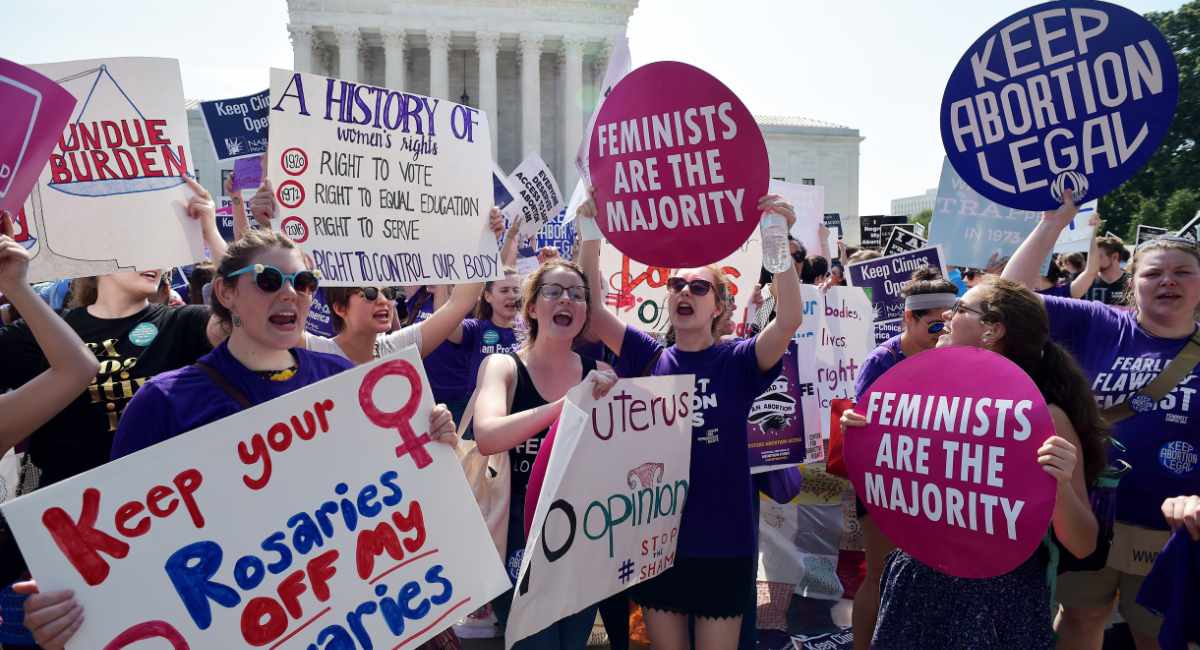In the wake of the Supreme Court denying requests to block the Texas Heartbeat Act (SB 8), abortion proponents have taken to citing a familiar slogan: “Abortion is health care.”
The Texas bill has earned the ire of many abortion proponents. Not only does it ban abortions that take place after a preborn child’s heartbeat becomes detectable around six weeks gestation, its private enforcement mechanism prevents the courts from blocking it. The law allows people to sue an abortionist, the abortion facility, or anyone who participates in an abortion (except for the mother of the aborted child) for up to $10,000 in statutory damages.
As of now, the Supreme Court has allowed the law to stand since it went into effect on September 1.
Abortion proponents like Rep. Rashida Tlaib and Speaker of the House Nancy Pelosi were quickly condemned the Court’s ruling. Responding on Twitter, Tlaib claimed the Court’s decision “signaled its willingness to overturn Roe and put millions of women in danger.”
“Abortion is healthcare,” she tweeted. “We must do everything we can to fortify that fundamental right—that means abolishing the filibuster and expanding the Court.”
Pelosi echoed these thoughts in a September 2 statement, claiming the Court chose to “uphold a flagrantly unconstitutional assault on women’s rights and health.” She wrote, “… SB8 delivers catastrophe to women in Texas, particularly women of color and women from low-income communities. Every woman, everywhere has the constitutional right to basic health care….”
Tlaib and Pelosi probably know that most would agree with the idea that it is wrong to deny a woman medical treatment based on her sex or race. Their argument equates restricting abortion access with health care discrimination, and the rhetoric is intended to inspire outrage against a supposed injustice.
This broadened redefinition of health care allows abortion proponents to gloss over what an abortion entails and fill its targeted audience with heated emotions. A closer examination of this argument, however, exposes its empty rhetoric and reveals the unfortunate implications behind the “abortion is health care” slogan.
Considering most abortion proponents know they cannot condone the direct killing of an innocent human being, their only defenses are to claim that preborn children are a lesser class of human with no right to exist (if they acknowledge their humanity at all), and that abortion is a vital part of women’s health care.
Instead of uplifting female autonomy, however, this argument undermines it with discriminatory language about women’s bodies and the natural functions of their reproductive system.
READ: ‘Bodily autonomy’ doesn’t mean women get to violently kill other humans
Demeaning Rhetoric
Health care is meant to prevent illness or restore someone from illness, and to save lives. As pro-life apologist Rachel Crawford explained in a 2019 Equal Rights Institute blog, abortion clearly does not qualify.
When abortion proponents cite their oft-repeated slogan, they make the claim that abortion is restorative health care, which seeks to correct a pathology. But according to Crawford, categorizing abortion this way is “sexist,” as it implies the female reproductive system is somehow “broken.”
“It doesn’t get much more misogynistic than saying that the distinctly female human ability to gestate babies is a sickness that should be corrected with medical intervention,” Crawford wrote. “This kind of thinking is predicated on the sexist belief that the male body is the normal human model and the female body is an abnormal variation. The narrative of what is ideal versus pathological has real world consequences because how we define anatomical norms shapes societal, cultural, and political beliefs.”
Now, abortion proponents and groups will likely deny that their argument equates pregnancy with some undesirable, feminine disease. Instead, they may counter with a bodily autonomy argument, claiming they only support the idea of women having the right to decide what is best for their well-being.
Crawford appears to have anticipated this argument, however, outlining how this perspective does not align with any standard definition of medical care. “Pathology, diagnosis, and treatment are based on objective facts,” the pro-life apologist wrote.
“It is incorrect to say that some pregnancies must be stopped for the sake of wellness while others are perfectly fine to continue dependent on the patient’s wishes, she wrote, adding, “You can’t radically relativize medical facts and say that your position is the ‘scientific’ or ‘rational’ one.”
Crawford then goes on to acknowledge the existence of potentially life-threatening pathologies that are unique to pregnant women, citing ectopic pregnancies as an example. This is a condition that arises when an embryo develops outside the uterus and requires immediate treatment to save the mother’s life.
“It is not sexist to say ‘we need to use medical intervention to solve this problem and save her life,’” Crawford wrote. “Because it doesn’t consider the healthy female body to be the problem; rather, it correctly identifies a legitimate pathology, that isn’t the pregnancy itself, to be the problem.”
While abortion proponents and advocacy groups claim their position stems from a desire to protect female autonomy and reproductive care, their preferred slogan ironically undermines both.
If pro-abortion politicians and abortion proponents desire to see women’s bodies treated with the same dignity as men’s, then they should look past the heated rhetoric and uphold legitimate, life-affirming forms of reproductive care that actually value women’s bodily integrity.
“Like” Live Action News on Facebook for more pro-life news and commentary!







